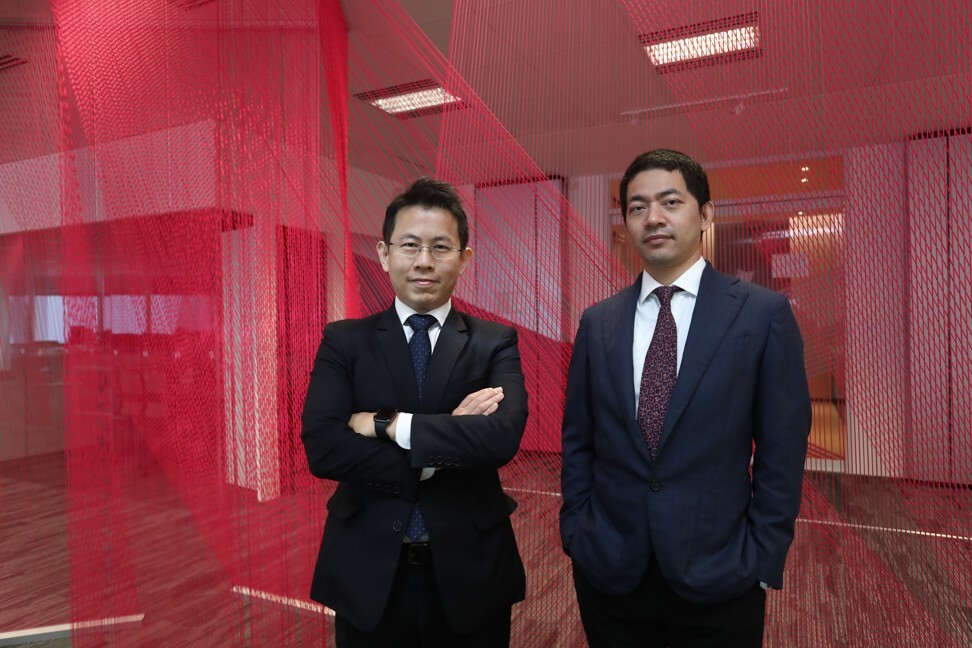
Hong Kong offers fertile ground for robo-advisory firms to grow and tap wealth management market in mainland China, Aqumon says
- Robo-advisory platform users are forecast to grow 28 per cent in 2021 while assets under management are projected to reach US$1.7 billion: Statista
- Environment for fintech start-ups in Hong Kong is improving and the future is bright, Aqumon says
The financial hub, whose stock market dates back to 1891, is the world’s third largest capital market and home to some 2,545 companies worth more than HK$50 trillion (US$6.4 trillion), according to stock exchange data.
“Hong Kong’s financial market is really huge. We have money coming from all over the world,” Aqumon’s co-founder and chief executive Kelvin Lei said in an interview. “Hong Kong also has got the best talent from all over the world, not just from mainland China and the city. It’s got the best talent in the finance and algorithm [fields].”

Robo-advisers are digital platforms that provide automated, algorithm-driven financial planning, a business pioneered by US-based Betterment two years after the 2008 global financial crisis. Some of the biggest global fund managers have since offered similar platforms to help construct investment portfolios for their clients.
Aqumon, founded in 2015, late last year launched SmartFund for ICBC Asia, a big data analytics platform that employs multi-factor algorithm-based analysis to provide scientific recommendations on almost 1,000 funds on the Chinese lender’s product shelf.
It has since partnered with over 80 financial institutions including AIA Group, CMB Wing Lung Bank, ChinaAMC and Guangzhou Rural Commercial Bank, covering more than 10 million end users.
“Hong Kong has a very solid foundation of the system for doing financial activities,” Lei said. “For example when we [launch] a robo-adviser, it is very easy for us in Hong Kong to do global asset allocation, because we can gain access to [global] financial markets very easily.”
The environment for Hong Kong start-ups is improving and the future for fintech is bright, he added.
More than HK$245 billion of securities changed hands every day on the Hong Kong stock exchange, while contracts on stock index options and futures were at record highs. As in every major market, the role of robo-advisers in Hong Kong is forecast to expand.
The number of people using robo-advisers in the city is expected to grow 28 per cent this year to 215,500, before reaching 368,800 in 2025, according to forecasts published by Statista. Assets under management are projected to reach US$1.74 billion in 2021 and US$6.4 billion in 2025, it said.
The US has the widest adoption with US$937 billion of assets under management in the robo-advisers segment this year, while China is ranked second with US$91 billion, according to Statista.
While the bay area offers immediate opportunities, fintech companies should set their sights on the entire mainland Chinese market as people readily embrace technology and trust brands from Hong Kong, Lei said in the interview.
“A lot of people [from mainland China] go to Hong Kong to buy insurance, and a lot of people go to Hong Kong as their first stop to go abroad,” he added. “This is the financial hub that both the east and the west trust.”
Aqumon was incubated at the Hong Kong University of Science and Technology and became the first independent robo-adviser to be accredited by the Securities and Futures Commission in 2017. Apart from the university, its investors include Cyberport, Alibaba Entrepreneurs Fund and an affiliate of Bank of China.
The firm currently has over 18,000 active trading users, mostly retail clients based in Hong Kong. The firm has more than 100 employees spread across its offices in Hong Kong, Shenzhen and Singapore. It plans to open an office in Shanghai.
“Our goal is to [launch an] IPO in three years, because everything is going very fast,” Lei said. “Our goal is to be number one in Asia [in the digital wealth management industry], and we’re not going to stop there.”

